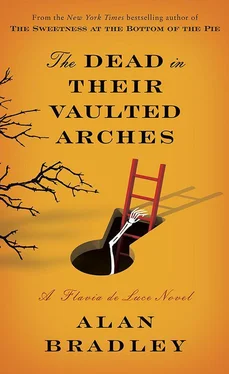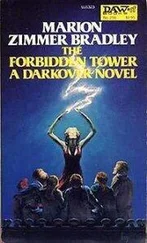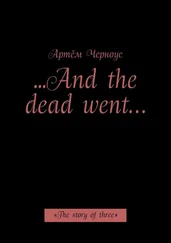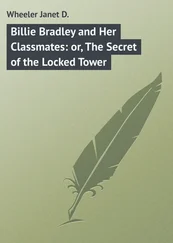But before beginning my actual work, I replaced and relit each one of the now guttering candles at the head and foot of the catafalque.
I would be needing all the light and all the heat they could generate.
Dare Lucem .
The coffin screws were the easy part. Since they were new and had not been moldering and rusting away in some damp old churchyard, they would be almost ridiculously simple to remove. In such a short time that it surprised even me, I had them loosened.
Now came the moment of truth.
“Saint Tancred, help me,” I whispered. “Harriet, forgive me.”
And with that, I lifted the lid.
It was as I had expected: Beneath the wooden lid was an inner coffin of zinc. Zinc for lightness, and although it was a somewhat harder metal than lead, still as easy as butter to cut through with the tin-snips.
Beneath the zinc, though, would be the face of my mother. What would she look like?
I began to prepare myself mentally. I forced myself to think like a scientist.
If her body was corrupt, I would go no further. There would be no point in it.
But if, on the other hand, she had been preserved miraculously in the ice of the glacier, I would begin immediately my efforts to restore her to life.
I worried a small hole in the zinc with the tip of the screwdriver and inserted one of the blades of the metal-cutting scissors.
Snip!
It was more difficult than I had thought.
Snip!
Already my thumb and forefinger were starting to feel bruised.
A slight gush of wind—or was it my imagination?—escaped from the coffin. I wrinkled my nose at the peculiar odor of soil, ice—and something else.
Had there been the faintest whiff of Harriet’s scent, Miratrix ?
Perhaps I was only willing it to be so.
Snip!
My fingers were already in pain, but I kept on cutting.
After what seemed an eternity, I had made a three-sided incision of no more than a foot each side. If my calculations were correct, I was working directly over Harriet’s face and chest.
Careful , I thought. Mustn’t damage her .
It was at that precise instant that I realized I had forgotten the blowtorch. If I needed to reseal the inner coffin, I would have to solder shut the cuts I had made in the zinc.
In order to do that, I would need not only the torch and a good supply of lead/tin solder, but also a sufficient quantity of flux. The first two were easy enough: Uncle Tar had kept the laboratory stocked well enough with tools to keep from ever having to bring in overly inquisitive tradesmen to repair his plumbing. The flux, though, was another matter. I had planned to concoct it myself by “killing” a solution of hydrochloric acid and water with bits of zinc dropped into it.
If I needed to do that now, it would require another trip to the lab and further delay.
Snip!
And then there was this: Although I had no fear of corpses, this one was obviously different. Would the act of coming face-to-face with my frozen mother result in some completely unforeseen shock to my system?
There was only one way to find out.
I inserted the screwdriver into the top edge of the cut and pried back the zinc with my fingers.
A wave of weakness washed over me. I nearly fainted.
There, just inches from my invading eyes, cradled in tendrils of curling gases, was the face of my mother, the long-lost Harriet.
Except for a slight darkening of the end of her nose, she looked exactly as she had in all the photos I had ever seen.
Fortunately, her eyes were closed.
She had a tiny smile on her lips—that was the first thing I noticed—and her skin was as pale as that of any fairy-tale ice princess.
It was like coming face-to-face with an image of my older self in a frosty mirror.
I was shaken with a shiver.
“Mother,” I whispered. “It’s me—Flavia.”
She did not respond, of course, but it had been necessary to speak to her nonetheless.
Something slipped and fell down beside her neck: a bit of solidified carbon dioxide. I had been right. They had packed her in card ice for the long trip home.
Vapors were rising from the coffin, swirling briefly in the light of the flickering candles before cascading in slow drifts to the floor to form an ankle-deep mist.
I touched her face with my forefinger. She was cold.
How easy it is to say that, and yet so difficult to do.
I became aware that my emotions were writhing inside me like snakes in a pit.
Some part of me of which I was not in control made me bend over and kiss her lips.
They were hard and as dry as parchment.
“Get on with it, Flavia,” I was telling myself. “You haven’t a lot of time.”
I needed to know at the outset if there was any warmth—any heartbeat. There wouldn’t be, of course, but I had to be sure. Every experiment must start with some basic given.
Harriet was still dressed in the climbing gear in which she had been found, with an outer coat of tan-colored gabardine that was already beginning to thaw, or at least to soften a bit from the heat of the candles.
I unfastened a stiff button on her breast and worked a hand inside, feeling for her heart.
As always, I had that brief irrational fear that I’ve had before with corpses: the feeling that the dead person is going to leap up suddenly, shout “Boo!,” and seize one’s hand in a deadly grip of ice.
Nothing of the sort happened, of course.
What did happen was that, among what felt like layered wool and silk and cotton, my fingers came into contact with something more substantial than fabric.
I moved my hand as gently as possible. Whatever was tucked inside Harriet’s clothing felt somewhat damp from the card ice, and brittle.
I seized it with the scissors of my first and second fingers and slowly worked it out and into the light: a large oilcloth wallet. It was as rigid as frozen fish skin.
I opened it with great care, but even so, several large flakes peeled off and fell away onto Harriet’s breast.
Inside was a single sheet of grayish musty paper, water-stained and folded into four.
My hands trembled as I flattened it out and read the penciled words:
This is the last will and testament of Harriet de Luce.
I hereby give, devise, and bequeath to my—
Bang!
I nearly leaped out of my hide.
A thunderous knock at the door was followed by another and another and yet another: Bang! Bang! Bang! Bang!
My immediate thought was that the noise would waken Father, whose bedroom was next door to Harriet’s boudoir. Or had Dogger, perhaps, given Father something to make him sleep?
“Who is it?” I called, my voice shaky in the sudden silence.
“It’s Lena,” came the hissed reply, muffled by the heavy paneling. “Unlock this door and let me in.”
I was too shocked to reply. Here I was standing over an open coffin, nearly nose-to-nose with my mother’s body, her last will and testament shaking in my hand—
It was like a fevered nightmare.
“Flavia!”
“Yes?” It was all I could think of.
“Open this door at once.”
Sometimes a very great shock has the effect of slowing down time, and this is exactly what happened. Almost as if disembodied, I watched myself shove the will into the wallet, drop it into the coal scuttle, close the zinc flap of the inner coffin, grab and replace the wooden lid from where I had leaned it against the wall, drape it with the black pall, shove the coal scuttle under and behind one of the heavy velvet hangings, turn the key, and open the door, all in slow motion.
“What are you doing?” Lena demanded. “Why did you have this door locked?”
Читать дальше












